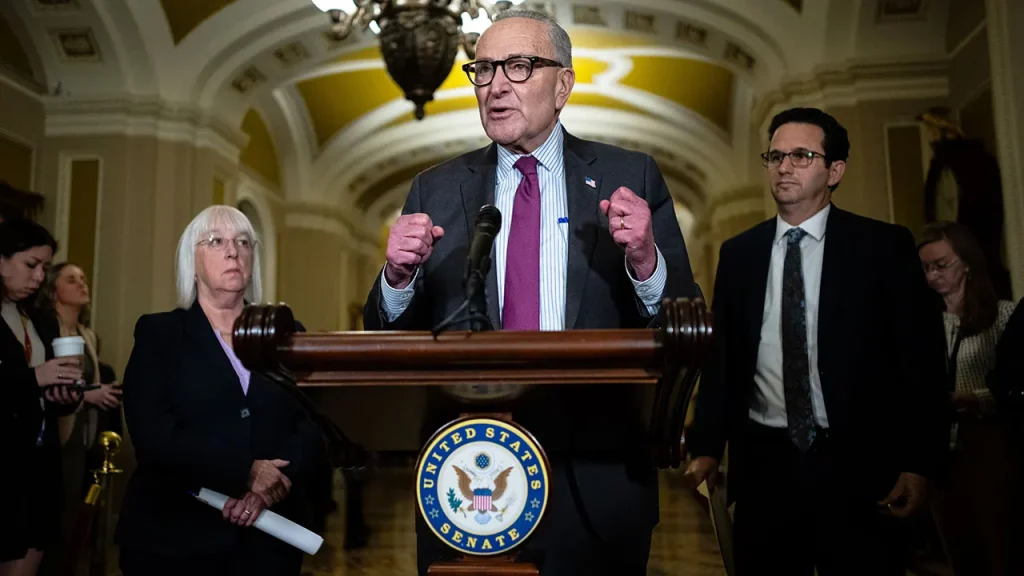Washington’s Shutdown Stalemate Enters Fifth Week with Little Progress
In Washington, the federal government shutdown is now dragging into its fifth week with no resolution in sight. Despite the approaching paycheck deadlines for thousands of federal workers, congressional leaders remain locked in a standoff that shows little sign of breaking. The Senate is expected to vote again on a House-passed continuing resolution (CR) that would fund the government through November 21, but after failing twelve previous times, few expect a different outcome this round.
At the heart of this extended impasse is a fundamental disagreement over healthcare funding. Senate Democrats, led by Minority Leader Chuck Schumer, are demanding guarantees to extend expiring Obamacare premium subsidies as part of any funding agreement. Republicans, meanwhile, insist the government must be reopened first before addressing healthcare concerns. Senate Majority Leader John Thune has characterized the Democrats’ position as pure politics rather than genuine policy concern, stating on the Senate floor: “They’d like you to believe that it’s about healthcare. It’s not. Republicans have been perfectly clear that we’re willing to have a discussion about healthcare, just not while government funding is being held hostage.” This central dispute has remained unchanged since the shutdown began nearly a month ago.
The human impact of this political deadlock grows more severe with each passing day. Air traffic controllers, who have been working without pay, are set to miss their first full paycheck this Tuesday after receiving only partial payment earlier this month. Military service members face their next payday on October 31, and while President Trump previously reallocated funds to cover their earlier paychecks, that money is not expected to stretch to this upcoming pay cycle. Senator Ted Cruz has introduced legislation to specifically fund air traffic controllers, while competing bills from Senators Ron Johnson and Chris Van Hollen aim to pay troops and “excepted” federal workers during the shutdown. However, partisan disagreements have stalled these targeted funding efforts, with Democrats concerned that Johnson’s bill would give the administration too much discretion over which federal employees receive pay.
Perhaps most concerning is the looming November 1 deadline when funding for the Supplemental Nutrition Assistance Program (SNAP), commonly known as food stamps, is expected to run out. This date also marks the beginning of open enrollment for Obamacare, creating a particularly fraught political and practical moment in the ongoing standoff. With millions of Americans relying on these programs, the consequences of continued congressional inaction grow more dire with each passing day. The shutdown’s effects are spreading beyond government offices, threatening essential services and support systems for vulnerable populations across the country.
In a significant development that may increase pressure on Democrats, the American Federation of Government Employees (AFGE), which represents over 800,000 federal workers and is traditionally aligned with Democratic causes, has broken ranks to call for an immediate end to the shutdown. In an open letter released Monday, AFGE President Everett Kelley urged Democrats to accept the Republican-backed clean continuing resolution to reopen the government while continuing discussions on other issues. “Because when the folks who serve this country are standing in line for food banks after missing a second paycheck because of this shutdown, they aren’t looking for partisan spin,” Kelley wrote. “They’re looking for the wages they earned. The fact that they’re being cheated out of it is a national disgrace.”
As the shutdown extends further, the political calculations on both sides grow more complex. Republicans believe time is on their side, arguing Democrats will eventually need to concede as the consequences of their stance become more painful for federal workers and beneficiaries of government programs. Democrats, however, remain convinced their position on healthcare funding is both politically popular and substantively necessary. Meanwhile, caught in the middle are hundreds of thousands of federal employees and millions of Americans who rely on government services, all watching anxiously as Washington’s political theater plays out at their expense. With each passing day, the shutdown not only damages government operations but erodes public faith in the institutions designed to serve them, leaving many to wonder when their leaders will finally prioritize functional governance over partisan advantage.













